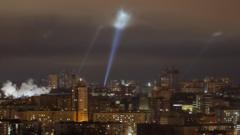Both Russia and Ukraine have ramped up military operations against each other's infrastructure shortly after a controversial call between Russian President Vladimir Putin and U.S. President Donald Trump. While Putin hinted at a pause in targeting energy facilities, Ukrainian President Volodymyr Zelensky reported ongoing attacks directly affecting civilian areas, including hospitals.
### Tensions Escalate: Russia and Ukraine Launch Attacks Following Trump-Putin Call

### Tensions Escalate: Russia and Ukraine Launch Attacks Following Trump-Putin Call
**Attacks on infrastructure escalate as both nations disregard calls for a ceasefire, with implications for civilian life.**
Ukrainian officials reported that Russia launched over 40 drones aimed at various Ukrainian targets, raising concerns about the impact on civilian life. Zelensky condemned these actions, stating, "It is these types of night-time attacks by Russia that destroy our energy sector, our infrastructure, and the normal life of Ukrainians." His remarks followed Putin’s assertion that a full ceasefire could only be considered if Ukraine's allies ceased military support, a demand that previous negotiations have already dismissed.
In response to escalating tensions, Russian defense authorities claimed to have intercepted and destroyed numerous Ukrainian drones, alleging that attacks in the Belgorod region had been repelled. The region remains contentious, with both sides reporting military engagements.
The fallout from the Trump-Putin dialogue indicates a significant disconnect, with Russia halting energy strikes seemingly as a tactical maneuver rather than a commitment to peace. As the Ukrainian military continues its drone offensives into Russian territory, primarily targeting energy facilities, the cycle of conflict appears far from resolution.
The international community now watches closely as ongoing negotiations in Saudi Arabia could influence the next steps in this protracted conflict, with observers wary of both humanitarian implications and geopolitical stability.
As the war rages on, the notion of peace remains elusive, leaving civilians caught in the midst of an intensifying struggle between two nations.
In response to escalating tensions, Russian defense authorities claimed to have intercepted and destroyed numerous Ukrainian drones, alleging that attacks in the Belgorod region had been repelled. The region remains contentious, with both sides reporting military engagements.
The fallout from the Trump-Putin dialogue indicates a significant disconnect, with Russia halting energy strikes seemingly as a tactical maneuver rather than a commitment to peace. As the Ukrainian military continues its drone offensives into Russian territory, primarily targeting energy facilities, the cycle of conflict appears far from resolution.
The international community now watches closely as ongoing negotiations in Saudi Arabia could influence the next steps in this protracted conflict, with observers wary of both humanitarian implications and geopolitical stability.
As the war rages on, the notion of peace remains elusive, leaving civilians caught in the midst of an intensifying struggle between two nations.



















